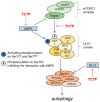Regulation of Autophagy Is a Novel Tumorigenesis-Related Activity of Multifunctional Translationally Controlled Tumor Protein
- PMID: 31968668
- PMCID: PMC7017196
- DOI: 10.3390/cells9010257
Regulation of Autophagy Is a Novel Tumorigenesis-Related Activity of Multifunctional Translationally Controlled Tumor Protein
Abstract
Translationally controlled tumor protein (TCTP) is highly conserved in eukaryotic organisms and plays multiple roles regulating cellular growth and homeostasis. Because of its anti-apoptotic activity and its role in the regulation of cancer metastasis, TCTP has become a promising target for cancer therapy. Moreover, growing evidence points to its clinical role in cancer prognosis. How TCTP regulates cellular growth in cancer has been widely studied, but how it regulates cellular homeostasis has received relatively little attention. This review discusses how TCTP is related to cancer and its potential as a target in cancer therapeutics, including its novel role in the regulation of autophagy. Regulation of autophagy is essential for cell recycling and scavenging cellular materials to sustain cell survival under the metabolic stress that cancer cells undergo during their aggressive proliferation.
Keywords: TCTP; autophagy; cancer.
Conflict of interest statement
The authors declare no conflict of interest.
Figures

References
Publication types
MeSH terms
Substances
LinkOut - more resources
Full Text Sources

